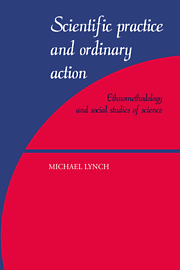Book contents
- Frontmatter
- Contents
- Acknowledgments
- Introduction
- 1 Ethnomethodology
- 2 The demise of the “old” sociology of science
- 3 The rise of the new sociology of scientific knowledge
- 4 Phenomenology and protoethnomethodology
- 5 Wittgenstein, rules, and epistemology's topics
- 6 Molecular sociology
- 7 From quiddity to haecceity: ethnomethodological studies of work
- Conclusion
- Name index
- Subject index
5 - Wittgenstein, rules, and epistemology's topics
Published online by Cambridge University Press: 03 December 2009
- Frontmatter
- Contents
- Acknowledgments
- Introduction
- 1 Ethnomethodology
- 2 The demise of the “old” sociology of science
- 3 The rise of the new sociology of scientific knowledge
- 4 Phenomenology and protoethnomethodology
- 5 Wittgenstein, rules, and epistemology's topics
- 6 Molecular sociology
- 7 From quiddity to haecceity: ethnomethodological studies of work
- Conclusion
- Name index
- Subject index
Summary
Perhaps the distinguishing mark of recent studies in the sociology of knowledge is their attempt to transform the traditional concerns of epistemology into topics for empirical investigation. Although proponents of the new sociology of scientific knowledge do not follow a single research program, many of them express interest in the philosophy of science. David Bloor paraphrases Wittgenstein by saying that sociology of scientific knowledge is “heir to the field that used to be called philosophy,” and he and Barry Barnes propose treating the “contents” of scientific knowledge as an appropriate topic for sociological investigation.
Some sociologists of knowledge use established philosophical positions as springboards for sociological research. Harry Collins, for instance, undertakes what he calls an “empirical relativist programme,” and Karin Knorr-Cetina suggests an empirical sociology supporting a constructivist philosophy of science. Followers of Anselm Strauss's “social worlds” approach, like Elihu Gerson, Susan Leigh Star, Adele Clark, and Joan Fujimura, use ethnographic and historical research to develop some of the epistemic initiatives raised by the American pragmatists. Bruno Latour and Michel Callon go somewhat further with their “actor-network” approach, deconstructing many of the basic conceptual distinctions in sociology and philosophy and placing those distinctions in a unique ontology in which human and nonhuman agencies emerge from a primordial semiotic ooze. Other scholars, like Michael Mulkay, embrace phenomenological and literary theoretical initiatives by insisting that epistemological and ontological positions should be treated as discursive registers that come into play in the scientific fields that sociologists of knowledge study.
- Type
- Chapter
- Information
- Scientific Practice and Ordinary ActionEthnomethodology and Social Studies of Science, pp. 159 - 202Publisher: Cambridge University PressPrint publication year: 1994

